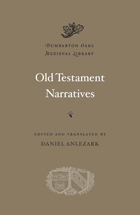
Religious piety has rarely been animated as vigorously as in Old English Poems of Christ and His Saints. Ranging from lyrical to dramatic to narrative, the individual poems show great inventiveness in reimagining perennial Christian topics. In different poems, for example, Christ expels Lucifer from heaven, resists the devil's temptation on earth, mounts the cross with zeal to face death, harrows hell at the urging of John the Baptist, appears in disguise to pilot a ship, and presides over the Last Judgment. Satan and the fallen angels lament their plight in a vividly imagined hell and plot against Christ and his saints.
In Andreas the poet relates, in language reminiscent of Beowulf, the tribulations of the apostles Andrew and Matthew in a city of cannibals. In The Vision of the Cross (also known as The Dream of the Rood), the cross speaks as a Germanic warrior intolerably torn between the imperative to protect his Lord and the duty to become his means of execution. In Guthlac A, an Anglo-Saxon warrior abandons his life of violence to do battle as a hermit against demons in the fens of Lincolnshire. As a collection these ten anonymous poems vividly demonstrate the extraordinary hybrid that emerges when traditional Germanic verse adapts itself to Christian themes.
Old English Poems of Christ and His Saints complements the saints' lives found in The Old English Poems of Cynewulf, DOML 23.

The Old English poems attributed to Cynewulf, who flourished some time between the eighth and tenth centuries, are unusual because most vernacular poems in this period are anonymous. Other than the name, we have no biographical details of Cynewulf, not even the most basic facts of where or when he lived. Yet the poems themselves attest to a powerfully inventive imagination, deeply learned in Christian doctrine and traditional verse-craft.
Runic letters spelling out the name Cynewulf appear in four poems: Christ II (or The Ascension), Juliana, The Fates of the Apostles, and Elene. To these a fifth can be added, Guthlac B, because of similarities in style and vocabulary, but any signature (if one ever existed) has been lost because its ending lines are missing. What characterizes Cynewulf’s poetry? He reveals an expert control of structure as shown from the changes he makes to his Latin sources. He has a flair for extended similes and dramatic dialogue. In Christ II, for example, the major events in Christ’s life are portrayed as vigorous leaps. In Juliana the force of the saint’s rhetoric utterly confounds a demon sent to torment her.

The Old English poems in this volume are among the first retellings of scriptural texts in a European vernacular. More than simple translations, they recast the familiar plots in daringly imaginative ways, from Satan's seductive pride (anticipating Milton), to a sympathetic yet tragic Eve, to Moses as a headstrong Germanic warrior-king, to the lyrical nature poetry in Azarias.
Whether or not the legendary Caedmon authored any of the poems in this volume, they represent traditional verse in all its vigor. Three of them survive as sequential epics in a manuscript in the Bodleian Library at Oxford. The first, the Old English Genesis, recounts biblical history from creation and the apocryphal fall of the angels to the sacrifice of Isaac; Abraham emerges as the central figure struggling through exile toward a lasting covenant with God. The second, Exodus, follows Moses as he leads the Hebrew people out of Egyptian slavery and across the Red Sea. Both Abraham and Moses are transformed into martial heroes in the Anglo-Saxon mold. The last in the triad, Daniel, tells of the trials of the Jewish people in Babylonian exile up through Belshazzar's feast. Azarias, the final poem in this volume (found in an Exeter Cathedral manuscript), relates the apocryphal episode of the three youths in Nebuchadnezzar's furnace.
READERS
Browse our collection.
PUBLISHERS
See BiblioVault's publisher services.
STUDENT SERVICES
Files for college accessibility offices.
UChicago Accessibility Resources
home | accessibility | search | about | contact us
BiblioVault ® 2001 - 2024
The University of Chicago Press









